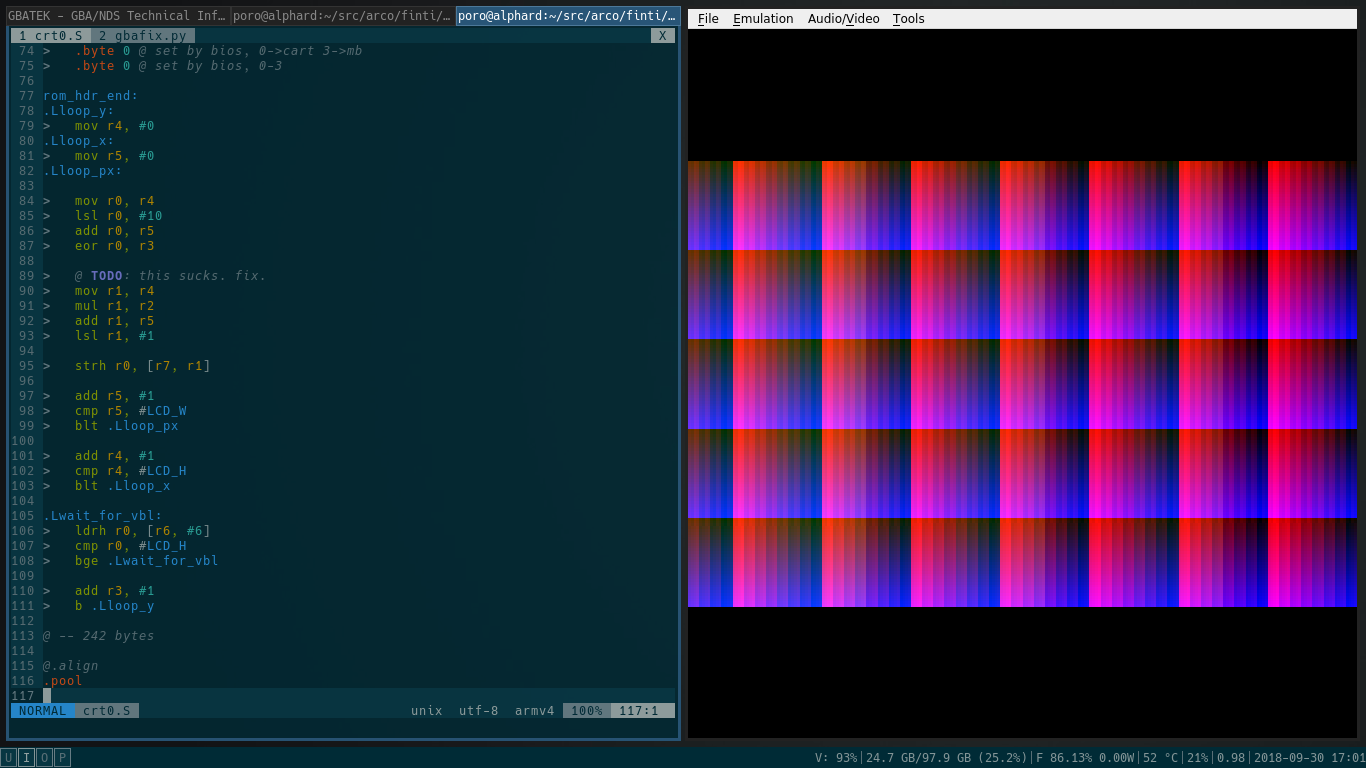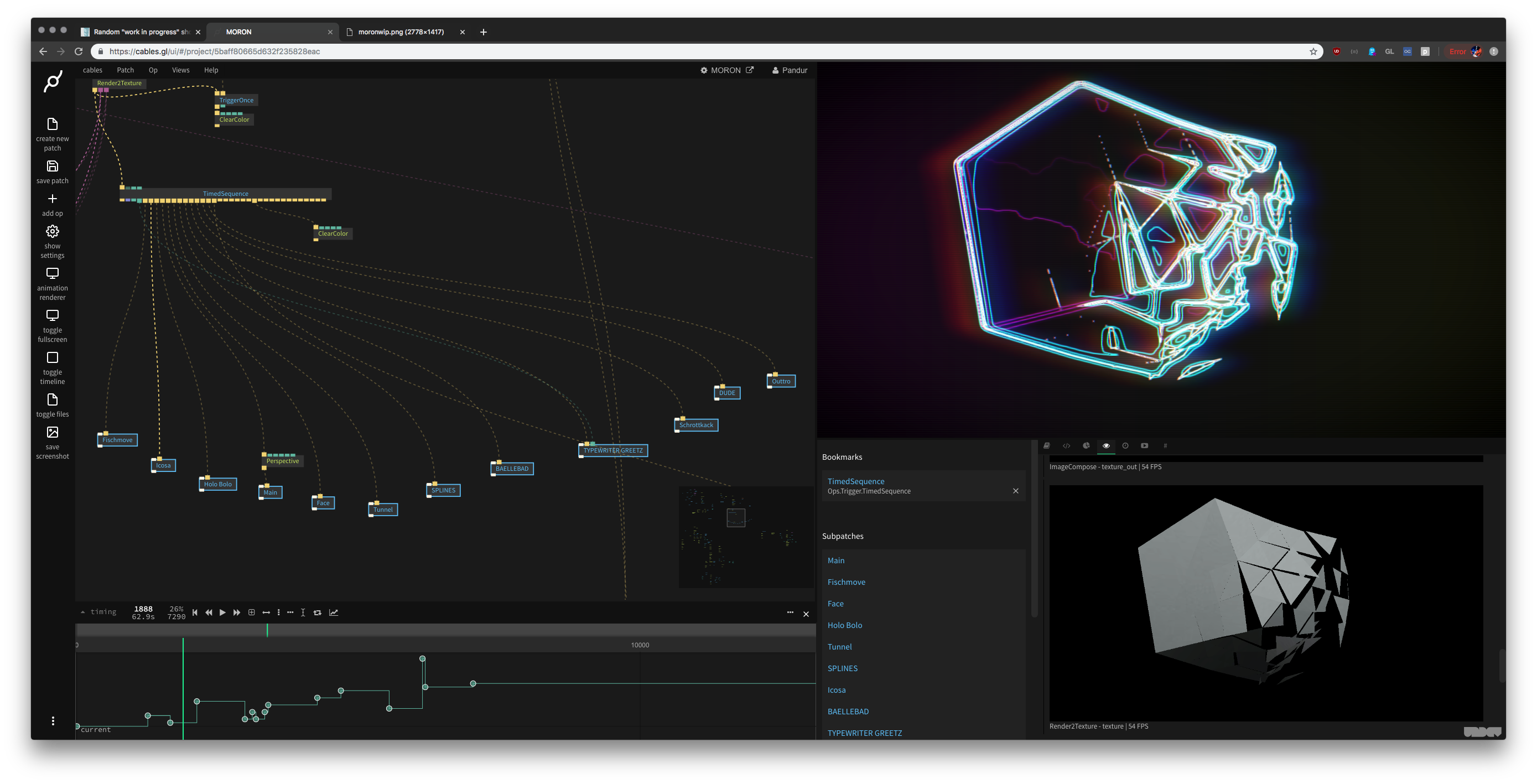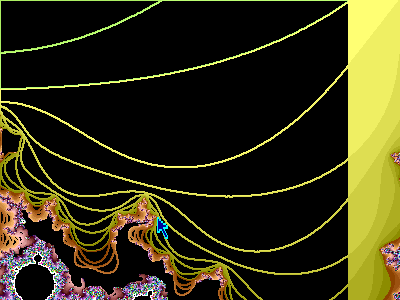Random "work in progress" shots
category: general [glöplog]
Quote:
OOohhh.. :O
Quote:
https://i.imgur.com/6szTEDn.mp4
Oh.. file was mp4
OTOH, this looks quite interesting as a starting point for a glitch demo
Quote:
Not strictly a work in progress shot, but I wrote up a thing about my demo:
http://gargaj.tumblr.com/post/178117551485/along-for-the-ride-a-reasonably-complex-demo
Thank you for the write-up, this was an interesting read. :)

Refraction!

g0blinish - nice! I smell a certain flavour of 6502 here :P
svoy, exactly (:

Thanks to Nintendo requiring their logo in the headers, this takes more bytes than on Linux >__>
Quote:
Thanks to Nintendo requiring their logo in the headers, this takes more bytes than on Linux >__>
And the youtube version everybody will watch is even bigger... :-(

Quote:
Some sobel with blur ? I really like this effect, and the colors!

oh boy, not enough memory for a fullscreen bitmap on the 84+ Silver (well, when stored in a matrix)
Parzival: indeed. It's better to use StorePic/RecallPic instead, but you'll lose offscreen drawing, double-buffering etc.
Or just use asm :P
Or just use asm :P
Almost forgot the line of code:
Code:
lea eax, [ebx+data-SYS_open]porocyon: I'm using BASIC and try to generate everything realtime, I feel like using Pic vars is cheating, in a way. I'll have to be clever, is all!
Newsflash: everything in every demo you've seen is cheating and dirty tricks. puls/pshu-style copying might be considered cheating compared to a regular 6502, but people used it anyway. Use the platform in its fullest extent.
That said,
That said,
Code:
(&BG_OFFSET[0])->x = ((xoff&0x1F)&0x10) >> 1;#voodoo
Fractals on a GBA using perturbation theory to speed things up to more that 2fps... Not quite there yet :D (Top image naiive rendering, bottom image cheating)

Not sure if this will really work yet. If you got an idea about it, maybe chime in on stackexchange.

Not sure if this will really work yet. If you got an idea about it, maybe chime in on stackexchange.
Quote:
#voodoo
#voodoo2 and 8bit textures only in 256x256px
@raer: interesting, I didn't know of this technique but I need to understand the math first or read a practical tutorial.
I did try long ago to port my Juhlia morpher from my GP32 demo Led Blur to GBA. Of course it was going at something like 2-3fps, then did lowres to get 8fps maybe, then forgot it. I was thinking if it's possible to predict areas (or just prestore for few frames of a small part for a demo) in an 8*8 grid that are solid color, something like calculate fractal only at 8*8, but if pixels are different go 4*4, 2*2, etc, tried it on PC with mandelbrot which improves speed a lot but still can produce artifacts.
I did try long ago to port my Juhlia morpher from my GP32 demo Led Blur to GBA. Of course it was going at something like 2-3fps, then did lowres to get 8fps maybe, then forgot it. I was thinking if it's possible to predict areas (or just prestore for few frames of a small part for a demo) in an 8*8 grid that are solid color, something like calculate fractal only at 8*8, but if pixels are different go 4*4, 2*2, etc, tried it on PC with mandelbrot which improves speed a lot but still can produce artifacts.
I tried a subdiving scheme. Calculate on a 16x16 (then subdivide to 8x8 and 4x4) grid and check if exit iteration counts match, then fill the whole block with one color. Then if the 4x4 blocks are not filled, I calculate every pixel with full precision. This sadly only helps in areas with few iterations, but it is an ok gain. The pixels near the border of the fractal are obviously the most expensive pixels with the most iterations, so I imagine the gain there would be really good, but its proving difficult...
I think algorithmic changes and approximations are needed to go beyond 3-4fps.
I think algorithmic changes and approximations are needed to go beyond 3-4fps.

In the middle you have inverse iteration method for Julia Fractal, it was fast enough on an 8 mhz ARM2 Archimedes.
Source (assembly in BBC basic) is here: http://abrobecker.free.fr/demos/starinfo.zip
But it's B&W...
Also Jan Vlietinck/BASS has made a fast and interesting Mandelbrot set plotter in which he was calculating the contours with same iteration, and fill the zones surrounded by pixels with same iteration. It's not clear but here's an image:

And the source: http://abrobecker.free.fr/alien/trackman.zip
I like where it went.


